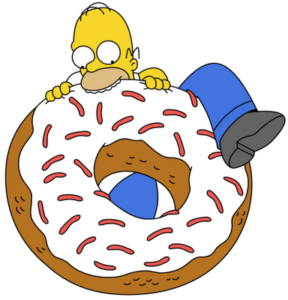Personal Trainer Reveals 5 Tips on How to Resist Peer Pressure to Break Your Diet
Some of you are probably laughing at this headline, saying how much peer pressure is out there to be thin and good looking. But if you’ve ever reached your goals and emerged lean, toned and size 0, you know exactly what I’m talking about here. “You are too thin!” you hear from your girlfriends you used to go out with. “Oh, come on, one glass of wine won’t kill you,” your guy friends tell you. “Just enjoy, you only live once,” your family keeps saying. Now you know what I mean. There are times you find yourself in situations where you feel obliged to eat just to be polite. What do you do?
Here are a few strategies my clients swear by and they help them eat healthy, feel relaxed and stay in control.
Successful Dieting in Social Situations
 1. Visualize Success — mental stimulation is the most powerful tool and visualizing yourself healthy, strong and fit is the best thing you can do for yourself. Visualize yourself enjoying your friends and family at parties and holiday gatherings instead of stressing about food. Imagine yourself leaving the party, feeling in control and proud of yourself for staying on course instead of feeling guilty and bad.
1. Visualize Success — mental stimulation is the most powerful tool and visualizing yourself healthy, strong and fit is the best thing you can do for yourself. Visualize yourself enjoying your friends and family at parties and holiday gatherings instead of stressing about food. Imagine yourself leaving the party, feeling in control and proud of yourself for staying on course instead of feeling guilty and bad.
2. Prepare several one-liners – before you go out or to a party, call one of your friends and tell her that you are training for a marathon or some other competition, and that your trainer is really strict and instructed you to only eat certain foods. This way you deflect the attention from you and actually get support from your friends, as they will try hard to help you stay on track.
3. Make a plan – before you arrive at the restaurant, call ahead and explain your dietary restrictions. Don’t worry, everyone these days has a food or foods they don’t or can’t eat. Use “allergy” excuse if they give you a hard time. When you arrive at the restaurant, you won’t have to worry about appearing difficult to your friends.
4. Tell a white lie – it’s often difficult to avoid drinking wine when you are out at a nice dinner. As soon as the server comes to the table to take drinks order, say loudly how you’ve been getting headaches when you drink and your doctor told you might be allergic to alcohol. That gets you off the hook immediately and because you announced it to the whole table, your friends will now feel bad pressuring you. Order sparkling water with lime instead.
How To Tell If You Are Hungry
We eat when we are happy. We eat when we are sad. We eat to celebrate. We eat when we are bored. Sometimes, we don’t even know why we are eating at all. One of the main reasons so many people are not at a healthy weight is because at some point, they stopped listening to their body. They don’t know when they are hungry and when they are actually full. It takes more than a few minutes for your body to register when you are full.
Scientists have been looking into what contributes to our appetite and hunger for many years. Our bodies are complex and Ghrelin, the so-called “hunger hormone,” signals your brain when you’re hungry. Nerves in the stomach send signals to the brain that you’re full, but these signals can take up to 20 minutes to communicate, and by that time, you may have already eaten too much. Moreover, the decision to eat is affected by a host of factors like sights, smells and social settings.
The real trick to managing weight is to eat less and more frequently. My clients go on a custom nutritional plan and eat five to six small meals every three hours throughout the day.
When you sit down for a meal, you want to be hungry but don’t let your blood sugar levels get so low that you feel ravenous and go on a binge. Having a planned meal at a planned time cuts down on how much you eat and the quality of your meal.
How do you tell real hunger from emotional hunger?
Real Hunger
- grows gradually
- can wait
- you stop when you feel full
- you feel good after eating
- you feel energized
Emotional Hunger
- hits suddenly
- you crave a specific food, usually high in fat or sugar
- needs to be satisfied instantly
- no amount of food fills you
- you feel guilty after eating
- you feel heavier or bloated
 Before you order a pizza or run to the kitchen, evaluate just how hungry you really are. If you ate less than two to three hours ago, then it’s unlikely you are feeling real hunger. If you have to have something, snack on a cucumber, celery or other veggies to tide you over until the next meal. Or drink a glass of water with fresh squeezed lemon juice. It will fool your body and stop the cravings.
Before you order a pizza or run to the kitchen, evaluate just how hungry you really are. If you ate less than two to three hours ago, then it’s unlikely you are feeling real hunger. If you have to have something, snack on a cucumber, celery or other veggies to tide you over until the next meal. Or drink a glass of water with fresh squeezed lemon juice. It will fool your body and stop the cravings.
When you do sit down for a meal, practice mindfulness. That means, no eating in front your television, computer and other distractions. Take pleasure in your meals and savor each bite. Take time to finish your meal, don’t inhale it. It will help you to know when you are full.
One of my favorite tricks is to include lean protein in your meals and snacks. They last longer in your tummy and keep you feeling fuller. Eat healthy soups, cooked grains and hot oatmeal; they create volume in your stomach and make you feel more satisfied.
Always pay attention to portions and avoid buffet lines.

